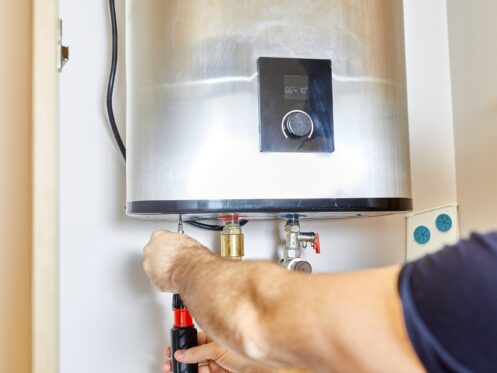If your water heater is giving you trouble, you might be wondering whether it’s better to repair it or replace it. It’s understandable to want to avoid spending money on repairs that may not solve the problem, but replacing the whole appliance can be quite a big investment. It’s all about figuring out the right time to make repairs and when it’s better to get a new one instead.
At Anderson Heating, Cooling, Plumbing & Electric in Mentor, OH, we’re here to help you assess your options and make an informed choice. A few signs, such as age, frequency of repairs, and performance issues, can help guide you in the right direction. Understanding these factors can help you make the right decision for your home and budget.
How Long Is a Water Heater’s Lifespan?
One of the most important factors when deciding whether to repair or replace your water heater is age. Traditional tank water heaters usually have a lifespan of 10 to 15 years, whereas tankless water heater models can occasionally last up to 20 years if they receive the right care. If your water heater is getting close to or has gone beyond its expected lifespan, it might be a good idea to replace it.
When evaluating your water heater’s age, note the model and year it was installed. If you’re not sure about the age of your water heater, there might be a sticker or serial number on it that shows when it was made. If your unit is getting up there in years and you’re noticing problems like water temperature fluctuating or leaks, it could be more cost-effective to replace it instead of sinking more money into repairs.
A water heater well past its prime may function less efficiently, leading to higher energy costs. Even if it can still be repaired, you might be spending more money fixing it than you would on a new, more energy-efficient model. Consult a professional plumber to get an honest assessment of the situation.
Constant Repairs Point to a Bigger Issue
If you find yourself calling the plumber for water heater repairs more often than you’d like, it could be a sign that your water heater is on its last legs. While occasional repairs are part of normal maintenance, frequent issues can add up quickly, both in terms of cost and inconvenience. For example, if you’re constantly replacing heating elements or fixing leaks, it might be time to think about replacement.
When a water heater needs constant attention, it can be frustrating. Replacing a faulty part here and there might seem like a quick fix, but it could also be masking an underlying issue that will continue to surface. A water heater with multiple issues is likely on its way out. In this case, a water heater replacement may save you more in the long run, avoiding further repair costs and the potential for unexpected breakdowns.
Newer water heaters often come with energy-efficient features that improve performance and lower your energy bills. If your current water heater is costing you more and more with frequent repairs, replacing it might be a smarter move for your wallet in the long run.
The Cost of Repairing vs. Replacing
Cost is often one of the biggest factors when deciding whether to repair or replace your water heater. While repair costs can vary depending on the problem, they can add up quickly if you’re facing frequent issues. If the repair costs are half or more of the price of a new water heater, it’s usually better to replace it.
Water heaters, especially older models, may become less efficient as they age, leading to increased energy consumption. While repairing might give you short-term relief, you may still need better efficiency to avoid high utility bills. The savings you’ll realize over time with a new water heater can make the investment worthwhile. Additionally, newer units tend to come with warranties that reduce the likelihood of surprise expenses.
If you are dealing with a major issue, such as a ruptured tank or severe sediment buildup, the repair costs may be so high that it doesn’t make sense to fix the water heater. In such cases, replacing the appliance could be more cost-effective and prevent you from wasting money on repeated repairs.
Troubleshooting Performance Issues
Performance is another key indicator of whether your water heater is due for a repair or replacement. If you’re experiencing inconsistent water temperatures, hearing odd sounds, or running out of hot water more quickly than usual, these could indicate that your water heater is having trouble. In some cases, these issues can be solved with a simple fix like replacing a heating element or clearing out sediment buildup. But in other cases, the problem might be so serious that replacement is the better option.
For example, your water heater may be taking longer than usual to heat water or not producing enough hot water for your needs. These performance issues are often caused by age, sediment buildup, or a failing component, which can often be repaired. However, if your water heater is old and you’ve already had multiple repairs, it may be time to upgrade to a more reliable, high-efficiency model. Additionally, if your water heater is constantly running out of hot water, you may need one with a larger capacity.
Troubling Signs You Can’t Ignore
Some signs of water heater trouble are hard to miss, such as a leaking tank or water that isn’t heating at all. Other signs may be more subtle, but they’re just as important to pay attention to. A change in water quality, like discolored or smelly water, is often a sign that the tank is rusting or that there’s sediment buildup inside the tank. Additionally, strange sounds, like rumbling or popping noises, could indicate sediment buildup at the bottom of the tank, which will affect the water heater’s performance and efficiency. This is another situation that might call for replacing the unit to prevent any more problems down the line.
Timing the Replacement to Maximize Efficiency
When it comes to water heaters, timing is everything. If you wait too long to replace an old, inefficient unit, you risk facing more significant problems and higher repair costs down the road. Additionally, replacing your water heater before it completely breaks down can help you avoid the inconvenience of being without hot water during a busy season.
It’s wise to replace your water heater before it shows signs of a complete breakdown. Many professionals recommend replacing a water heater every 10 to 15 years, depending on its type and condition. By replacing it proactively, you can keep your home supplied with hot water while taking advantage of a more energy-efficient model. A professional inspection can help you determine the best time to replace your water heater.
Call Us Today
At Anderson Heating, Cooling, Plumbing & Electric, we know that making the decision to repair or replace your water heater doesn’t have to be stressful. By keeping an eye on its performance, understanding its age, and considering repair costs, you can determine the best course of action. Whether it’s a minor fix or time for a replacement, addressing the issue promptly can save you headaches and keep your household running smoothly. We also offer other plumbing services and can help with your drain and sewer, electrical, plumbing, hydro jetting, HVAC, and rewiring needs.
If you’re ready to make the best choice for your water heater in Mentor, reach out to Anderson Heating, Cooling, Plumbing & Electric today to explore your options.


